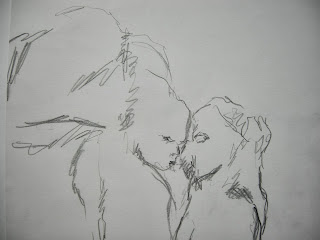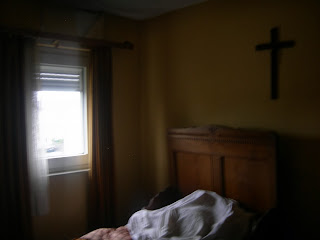A person who has not been completely alienated, who has remained
sensitive and able to feel, who has not lost the sense of dignity, who
is not yet "for sale", who can still suffer over the suffering of
others, who has not acquired fully the having mode of existence -
briefly, a person who has remained a person and not become a thing -
cannot help feeling lonely, powerless, isolated in present-day society.
He cannot help doubting himself and his own convictions, if not his
sanity. He cannot help suffering, even though he can experience moments
of joy and clarity that are absent in the life of his "normal"
contemporaries. Not rarely will he suffer from neurosis that results
from the situation of a sane man living in an insane society, rather
than that of the more conventional neurosis of a sick man trying to
adapt himself to a sick society.
Monday, 23 December 2013
Thursday, 12 December 2013
Goethe's Faust, Part I. Monologue
I've studied now Philosophy
And Jurisprudence, Medicine,—
And even, alas! Theology,—
From end to end, with labor keen;
And here, poor fool! with all my lore
I stand, no wiser than before:
I'm Magister—yea, Doctor—hight,
And straight or cross-wise, wrong or right,
These ten years long, with many woes,
I've led my scholars by the nose,—
And see, that nothing can be known!
That knowledge cuts me to the bone.And Jurisprudence, Medicine,—
And even, alas! Theology,—
From end to end, with labor keen;
And here, poor fool! with all my lore
I stand, no wiser than before:
I'm Magister—yea, Doctor—hight,
And straight or cross-wise, wrong or right,
These ten years long, with many woes,
I've led my scholars by the nose,—
And see, that nothing can be known!
I'm cleverer, true, than those fops of teachers,
Doctors and Magisters, Scribes and Preachers;
Neither scruples nor doubts come now to smite me,
Nor Hell nor Devil can longer affright me.
Doctors and Magisters, Scribes and Preachers;
Neither scruples nor doubts come now to smite me,
Nor Hell nor Devil can longer affright me.
Sunday, 8 December 2013
Saturday, 7 December 2013
Fragmented Intentions
Fragmented intentions is given some sense
'till foreordination breaks down to base bits.
Epiphanies unveil repeated attempts
to capture intangible, looping the wits.
Realizations that merely show
how much there is out there
how little I know.
Sunday, 17 November 2013
Wittgenstein on Mysticism
In his first and last work Tractatus Logico-Philosophicus, Ludwig Wittgenstein was primarily concerned with the logic of language. For him, it was only logical language expressed through physics and mathematics that could answer philosophical questions (and he believed to have solved all of them). This approach made anything else illogical and hence irrelevant to mention, even though these subjects were anything but irrelevant in themselves.
Such subjects were questions of religion and mysticism that might have been incoherent in the means of logic, but that nonetehelss were the most crucial part of our human experience. His criticism of language demands for a clarity of speech that encourages only to communicate that which is logically deductible, and to remain silent over that which can only be experienced.
Some of those mystic experiences he describes are faith and confidence in the face of hardships, as the WWII certainly was for him. With his realization that "Whatever happens, nothing can happen to me", Wittgenstein expresses a profound sense of security that could not even be shattered in the face of hardships. Whatever the circumstances were, he managed to find miracles that do not reflect on "...how the world is, but that the world exists", converging himself to the philosophy of wonder. Wittgenstein thus calls to focus on the present, as the past is already gone and the future is uncertain anyway. That the world exists, is a present in itself, so that for those who can not appreciate and feel the mystic moment of the presence by themselves, it is impossible and arduous to explain in abstract words. Hence, the unmentionable is building the foundation for Wittgensteins philosophy of silence, with which he is yet able to communicate the ineffable. Or to say it in Goethe's words: "A thinking man's greatest happiness is to have fathomed what can be fathomed and to revere in silence what cannot be fathomed".
Such subjects were questions of religion and mysticism that might have been incoherent in the means of logic, but that nonetehelss were the most crucial part of our human experience. His criticism of language demands for a clarity of speech that encourages only to communicate that which is logically deductible, and to remain silent over that which can only be experienced.
Some of those mystic experiences he describes are faith and confidence in the face of hardships, as the WWII certainly was for him. With his realization that "Whatever happens, nothing can happen to me", Wittgenstein expresses a profound sense of security that could not even be shattered in the face of hardships. Whatever the circumstances were, he managed to find miracles that do not reflect on "...how the world is, but that the world exists", converging himself to the philosophy of wonder. Wittgenstein thus calls to focus on the present, as the past is already gone and the future is uncertain anyway. That the world exists, is a present in itself, so that for those who can not appreciate and feel the mystic moment of the presence by themselves, it is impossible and arduous to explain in abstract words. Hence, the unmentionable is building the foundation for Wittgensteins philosophy of silence, with which he is yet able to communicate the ineffable. Or to say it in Goethe's words: "A thinking man's greatest happiness is to have fathomed what can be fathomed and to revere in silence what cannot be fathomed".
Tuesday, 5 November 2013
Thursday, 31 October 2013
Sunday, 27 October 2013
Autopilot Regression
Excessive thoughts
though just ineffective
Cause always the same
Without sense and aim
Therefore no resolving
Metamorphosis repeating
In circles revolving
Ever searching for meaning
Without a connection
To outer occasions
Neglecting key questions
Autopilot regression
Self-inflicted ego
Twixt micro and macro
Constant antagonism
Between foolery and reason.
Thursday, 24 October 2013
✝ Pious Edifice ✝
This peculiar house caught my eye when I saw some workers on the street carrying out its furniture. They allowed me to have a snoop around, so I took these pictures to capture some of the oddly absorbing atmosphere.
The residents were two older sisters who had just moved to a nursing home. Since the early 1950s, the unmarried and childless siblings had lived in the house in a very solitary and isolated way, and it appeared as if they had never changed a bit of their very own time capsule. Now that they were too old to look after themselves, they had to leave behind almost all of their personal belongings like clothes, books, or their vast selection of wooden crosses. The sisters knew only too well that the physical world was not more but a deceitful one, and had thus chosen the spiritual life with devotion: their faithfulness could not only be witnessed by the many bibles in the bookshelves, but especially by the rare and massive crosses hanging from the walls of about every single bedroom in the three storage house.
The residents were two older sisters who had just moved to a nursing home. Since the early 1950s, the unmarried and childless siblings had lived in the house in a very solitary and isolated way, and it appeared as if they had never changed a bit of their very own time capsule. Now that they were too old to look after themselves, they had to leave behind almost all of their personal belongings like clothes, books, or their vast selection of wooden crosses. The sisters knew only too well that the physical world was not more but a deceitful one, and had thus chosen the spiritual life with devotion: their faithfulness could not only be witnessed by the many bibles in the bookshelves, but especially by the rare and massive crosses hanging from the walls of about every single bedroom in the three storage house.
The merciful sisters have surely saved their places in heaven. For me, however, this place was rather reminiscent of a setting for a David Lynch movie, albeit a very pious one. Blessed be them sisters!
Welcome Home
A bedroom with a sink keeps away the stink.
The red telephone: always in-line with the divine.
The Sisters.
Ah, hello There!
A perfect chiaroscuro - I bet Caravaggio would have loved it!
Naptime.
Painterly colour schemes...
...and radiating drapery
Sunday, 20 October 2013
Beelitz-Sanatoriums
The Beelitz-Sanatoriums were built in three phases between 1898 and 1930 in Potsdam, nearby Berlin. They consist of more than 60 building complexes that served as hospitals for patients with tuberculosis and as psychiatric wards. During WWI and WWII, the buildings were mainly used as sickbays for casualties. In 1916, one of the wounded soldiers staying as an in-patient for two months was Adolf Hitler. After WWII, like most parts of eastern Germany, Potsdam was occupied by the Red Army. Up until 1994 the Soviets utilized the buildings as the biggest military hospital outside of the UDSSR.
The edifices might have been abandoned by the end of the cold war, but they still radiate vividly and invite the viewer for a time travel beyond compare. The picturesque scenery has not only captivated many photographers, but it has also inspired directors like Wolfgang Becker or Roman Polanski, who filmed The Piano at this very spot.
I sneaked through one of the fences in order to capture some of the spectacular atmosphere. The focus lies in the contrapositions of light and darkness, the inside and the outside, as well as on the natural vs. the cultivated; Broken windows that let in the diffused light, layers of paint crumbling down and cracking up an undeniable past, and nature reclaiming back what has once been its own realm creates a unique ambience in which one can almost touch the time pass by.
I sneaked through one of the fences in order to capture some of the spectacular atmosphere. The focus lies in the contrapositions of light and darkness, the inside and the outside, as well as on the natural vs. the cultivated; Broken windows that let in the diffused light, layers of paint crumbling down and cracking up an undeniable past, and nature reclaiming back what has once been its own realm creates a unique ambience in which one can almost touch the time pass by.
Subscribe to:
Posts (Atom)
"Pretty Day" by Marie Möör
Chanson: Marie Möör - Pretty Day (1982) Film: Ballet Mécanique (1924) de Fernand Léger

-
Nietzsche vs. Schopenhauer Schopenhauer's concept of cosmic pain (Weltschmerz) and his philosophy of compassion (Mitleid), explore...
-
Chanson: Marie Möör - Pretty Day (1982) Film: Ballet Mécanique (1924) de Fernand Léger


























































































